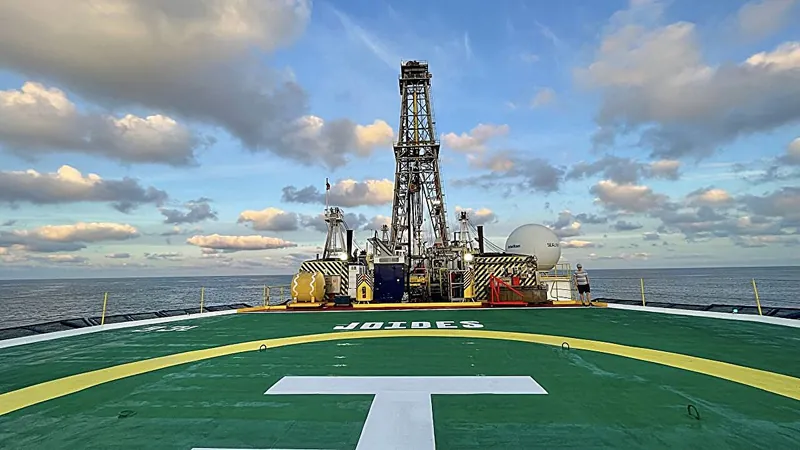
Shocking New Study Uncovers Deep Ocean Secrets Behind Ancient Ice Ages!
2024-11-08
Author: Wei
Shocking New Study Uncovers Deep Ocean Secrets Behind Ancient Ice Ages!
In a groundbreaking revelation that could reshape our understanding of Earth's climate history, a recent study published in the prestigious journal Science has challenged long-standing theories about the origins of the ice ages. Spearheaded by a formidable team of scientists from the Woods Hole Oceanographic Institution, Lamont-Doherty Earth Observatory, Scripps Institution of Oceanography, and Cardiff University, this research shines a spotlight on the deep ocean's pivotal role during the Mid-Pleistocene Transition—a mysterious climatic shift that began approximately 1 million years ago.
Historically, many theories about the Mid-Pleistocene Transition emphasized a significant weakening of the Atlantic Meridional Overturning Circulation (AMOC) as the primary driver of climate fluctuations. However, this new study unveils a far more intricate narrative, suggesting that the deep ocean may have played a critical and complex role in these global changes.
Employing climate records that span an impressive 1.2 million years, the research team meticulously reconstructed vital properties of the deep ocean that are integral to our understanding of oceanic flow and its capacity to sequester carbon. The lead author, Dr. Sophie Hines, an Assistant Scientist at WHOI, articulated the profound significance of their findings: “The deep ocean is massive and far more capable of storing carbon dioxide (CO2) than the atmosphere. A seemingly minor alteration in ocean circulation could potentially have dramatic consequences for global climate.”
The researchers meticulously analyzed sediment core samples retrieved during the International Ocean Discovery Program (IODP) Expedition 361 off the coast of Cape Town, South Africa. Through the examination of isotopes from neodymium and carbon and oxygen signatures from fossils of single-celled organisms known as foraminifera, they unraveled complex changes in deep ocean temperatures, salinity, and the intermingling of waters from both northern and southern hemispheres.
“Our findings indicate that shifts in various deep ocean properties do not always coincide,” emphasized Dr. Sidney Hemming, a renowned expert at the Lamont-Doherty Earth Observatory and co-chief scientist of the expedition. “We demonstrate that the intensification of ice ages was primarily influenced by changes surrounding Antarctica, rather than solely by Atlantic dynamics.”
One of the most revealing implications of this study is that as the Antarctic Ice Sheet grew, it enhanced the ocean's ability to store carbon. This, in turn, led to decreased atmospheric CO2 levels, ushering in colder climates and extending the duration of ice age cycles.
“Our research illuminates the complicated interactions between ocean dynamics and climate change, highlighting the vital importance of the Southern Ocean in decoding our planet's climate narrative,” stated Dr. Hines.
In light of recent studies that underscore the urgent challenges posed by human-induced climate change—especially concerning the declining AMOC—understanding Southern Ocean dynamics is more critical than ever. As this region continues to experience alarming warming trends, its changes could reverberate across ecosystems and weather patterns globally, with potentially catastrophic consequences.
With this new understanding, could we be on the brink of uncovering even greater secrets locked within the depths of our oceans? Stay tuned as scientists dive deeper into this urgent and fascinating field of research!


 Brasil (PT)
Brasil (PT)
 Canada (EN)
Canada (EN)
 Chile (ES)
Chile (ES)
 España (ES)
España (ES)
 France (FR)
France (FR)
 Hong Kong (EN)
Hong Kong (EN)
 Italia (IT)
Italia (IT)
 日本 (JA)
日本 (JA)
 Magyarország (HU)
Magyarország (HU)
 Norge (NO)
Norge (NO)
 Polska (PL)
Polska (PL)
 Schweiz (DE)
Schweiz (DE)
 Singapore (EN)
Singapore (EN)
 Sverige (SV)
Sverige (SV)
 Suomi (FI)
Suomi (FI)
 Türkiye (TR)
Türkiye (TR)